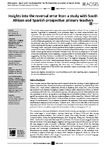Mostrar o rexistro simple do ítem
Insights into the Reversal Error from a Study with South African and Spanish Prospective Primary Teachers
| dc.contributor.author | Soneira, Carlos | |
| dc.contributor.author | Bansilal, Sarah | |
| dc.contributor.author | Govender, Reginald Gerald | |
| dc.date.accessioned | 2022-04-11T08:22:43Z | |
| dc.date.available | 2022-04-11T08:22:43Z | |
| dc.date.issued | 2021 | |
| dc.identifier.citation | Soneira, C., Bansilal, S., & Govender, R. (2021). Insights into the reversal error from a study with South African and Spanish prospective primary teachers. Pythagoras, 42(1), a613. https://doi.org/10.4102/pythagoras.v42i1.613 | es_ES |
| dc.identifier.uri | http://hdl.handle.net/2183/30440 | |
| dc.description.abstract | [Abstract] This study, using a quantitative approach, examined Spanish and South African pre-service teachers’ responses to translating word problems based on direct proportionality into equations. The participants were 79 South African and 211 Spanish prospective primary school teachers who were in their second year of a Bachelor of Education degree. The study’s general objective was to compare the students’ proficiency in expressing direct proportionality word problems as equations, with a particular focus on the extent of the reversal error among the students’ responses. Furthermore, the study sought to test the explanatory power of word order matching and the static comparison as causes of the reversal error in the two contexts. The study found that South African students had a higher proportion of correct responses across all the items. While nearly all the errors made by Spanish students were reversals, the South African group barely committed reversal errors. However, a subgroup of the South African students made errors consisting of equations that do not make sense in the situation, suggesting that they had poor foundational knowledge of the multiplicative comparison relation and did not understand the functioning of the algebraic language. The study also found that the word order matching strategy has some explanatory power for the reversal error in both contexts. However, the static comparison strategy offers explanatory power only in the Spanish context, suggesting that there may be a difference in curriculum and instructional approaches in the middle and secondary years of schooling, which is when equations are taught | es_ES |
| dc.description.sponsorship | This work was supported by Spanish Government through the project PGC2018-096463-B-I00 as well as the National Research Foundation (NRF) grant number UID 118377 | es_ES |
| dc.description.sponsorship | South Africa. National Research Foundation (NRF); UID 118377 | es_ES |
| dc.language.iso | eng | es_ES |
| dc.publisher | Association for Mathematics Education of South Africa | es_ES |
| dc.relation | info:eu-repo/grantAgreement/AEI/Plan Estatal de Investigación Científica y Técnica y de Innovación 2017-2020/PGC2018-096463-B-I00/ES/USO DE SISTEMAS TUTORIALES INTELIGENTES PARA ESTUDIAR ASPECTOS COGNITIVOS Y AFECTIVOS EN LA ENSEÑANZA Y EL APRENDIZAJE DE LA RESOLUCION DE PROBLEMAS VERBALES/ | |
| dc.relation.uri | https://doi.org/10.4102/pythagoras.v42i1.613 | es_ES |
| dc.rights | Atribución 4.0 Internacional | es_ES |
| dc.rights.uri | http://creativecommons.org/licenses/by/4.0/ | * |
| dc.subject | Algebra | es_ES |
| dc.subject | Reversal error | es_ES |
| dc.subject | Word problems | es_ES |
| dc.subject | Word order matching | es_ES |
| dc.subject | Static comparison | es_ES |
| dc.subject | Pre-service mathematics teachers | es_ES |
| dc.title | Insights into the Reversal Error from a Study with South African and Spanish Prospective Primary Teachers | es_ES |
| dc.type | info:eu-repo/semantics/article | es_ES |
| dc.rights.access | info:eu-repo/semantics/openAccess | es_ES |
| UDC.journalTitle | Pythagoras | es_ES |
| UDC.volume | 42 | es_ES |
| UDC.issue | 1 | es_ES |
| UDC.startPage | a613 | es_ES |
| dc.identifier.doi | 10.4102/PYTHAGORAS.V42I1.613 |
Ficheiros no ítem
Este ítem aparece na(s) seguinte(s) colección(s)
-
GI-IECM - Artigos [43]






